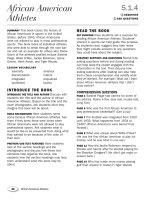4 4 16 stagecoach travel (social studies)
Bạn đang xem bản rút gọn của tài liệu. Xem và tải ngay bản đầy đủ của tài liệu tại đây (4.74 MB, 18 trang )
Stagecoach
Travel
by Darleen Ramos
H O UG H T O N MIF F L IN
Stagecoach
Travel
by Darleen Ramos
PHOTOGRAPHY CREDITS: Cover © Bill Brooks/Alamy; tp © CORBIS. Photographer: John C.H. Grabill; 2 © Masterfile;
3 © American School, (19th century) Medium: colour lithograph Bridgeman Art Library; 4 © CORBIS. Photographer: John
C.H. Grabill; 5 © Victor Adam/Getty Images; 7, 8 © CORBIS; 10 © Photo Collection Alexander Alland, Sr./CORBIS;
11 © imagebroker/Alamy; 12, 13 © CORBIS; 14 © Bill Brooks/Alamy.
Copyright © by Houghton Mifflin Harcourt Publishing Company
All rights reserved. No part of this work may be reproduced or transmitted in any form or by any means, electronic or
mechanical, including photocopying or recording, or by any information storage and retrieval system, without the prior
written permission of the copyright owner unless such copying is expressly permitted by federal copyright law. Requests
for permission to make copies of any part of the work should be addressed to Houghton Mifflin Harcourt School Publishers,
Attn: Permissions, 6277 Sea Harbor Drive, Orlando, Florida 32887-6777.
Printed in China
ISBN-13: 978-0-547-02322-9
ISBN-10: 0-547-02322-7
1 2 3 4 5 6 7 8 0940 18 17 16 15 14 13 12 11
If you have received these materials as examination copies free of charge, Houghton Mifflin Harcourt School Publishers
retains title to the materials and they may not be resold. Resale of examination copies is strictly prohibited.
Possession of this publication in print format does not entitle users to convert this publication, or any portion of it, into
electronic format.
It is easy to travel today. People jump in
their cars or take trips on trains or airplanes.
The ride is fast and comfortable. Travelers can
turn on heat or air conditioning as needed.
They can listen to music or even watch a movie.
But travel in the Old West was different. Trips
were tough, uncomfortable, and long.
Travel today is a very different experience from travel
in the Old West.
2
The Concord coach was made from wood,
iron, brass, and leather.
During the 1800s, Americans headed west
looking for land and opportunity. It was a
chance for many to start a new life in a new
place. In the 1840s, another rush started.
People went west looking for gold.
At that time, there were only a few ways
to travel west. People could ride horses, take a
covered wagon, or travel in a stagecoach.
3
The Legend
Movies paint a romantic picture of
stagecoach travel. The coaches look big
and roomy. The driver sits high on his seat
with polished boots. He looks worthy of his
important job. The horses are beautiful and
gallop most of the trip. Smiling travelers are
well-dressed, and the trip is always exciting.
This common image cannot be defended.
Stagecoaches were often crowded with passengers.
4
Wagons had to be sturdy to withstand the
bumpy trip west.
The Coaches
Actually, stagecoaches were small, and the
passengers were crammed inside. The two
types of passenger coaches were the Celerity
Wagon and the Concord Coach.
The Celerity had a canvas top and canvas
sides that made it light in weight. These light
wagons could travel fast over rough roads. The
seats were cushioned, and the middle seat could
fold down into a bed.
5
The original Concord coaches were
designed for use in the East where roads were
smoother. A more sturdy coach had to be built
for the journey west. There, roads were more
like trails. The bumpy ride west would break
glass windows, so the new Concords had heavy
leather flaps instead that could be rolled up.
Coaches were built to seat from four to
sixteen passengers inside. More passengers
could sit on top.
6
Some travelers sat on top of a stagecoach.
It was rough to ride in a stagecoach.
Travelers were cramped and uncomfortable.
During the summer, it was hot and dusty. In
the winter, it was freezing cold. There wasn’t
much to do but look out the window or talk to
fellow travelers. The journey was often long.
7
The Drivers
The stage drivers were strong. They had to
handle a team of four to six horses. It was not
easy driving a stagecoach through hot deserts
and along dangerous mountain trails.
Stage drivers had a reputation for being
fast drivers. But, most knew better than to run
the horses the entire trip. Often, the horses
were allowed to trot. The drivers just put on a
good show when
arriving at or
leaving a town.
The driver’s seat
was seven feet
above the ground.
8
The Journey West
Most stage lines, or routes, were long.
The famous Butterfield Overland line was
2,795 miles! It started in St. Louis, Missouri,
and ended in San Francisco, California.
The trip cost $200 and took up to 25 days.
Traveling over mountains in a stagecoach
took a long time.
Stage stations were set up every 15 to 20
miles to change horses. Fresh horses replaced
tired horses. The change only took a few
minutes. Some stations served quick meals and
travelers could spend the night.
9
The comforts of a town provided a welcome rest from
the bumpy road!
When the stagecoach rolled into a town, the
townspeople ran to meet it. Children escorted
the coach to its stop. A stagecoach meant mail
and visitors. For those who traveled, a town
meant a place to clean up, eat a good meal,
and sleep in a comfortable bed. Who wouldn’t
deserve a good rest after getting bumped up
and down for miles and miles?
10
Dangers on the Road
Stagecoach travel had many dangers. A loud
noise or a rattlesnake could make jumpy horses
bolt. If the lead horses ran off a cliff, the entire
coach could follow.
Weather was a big concern, too. Deep
snow made the ride almost impossible. In the
spring, rivers swelled from heavy rain. Crossing
them was dangerous. Churning currents could
overturn the coach.
Flooded rivers were too dangerous to cross.
11
Travelers feared attacks by thieves along the trails.
Sadly, stagecoaches were often robbed.
Thieves stole goods, cash, and watches from
passengers. Robbers held up stagecoaches on
roads where the driver could not escape. Some
drivers were armed. But in a hold-up situation,
drivers used their weapons only to protect
passengers. The passengers relied on the driver
for their safety.
12
End of the Line
From about 1840 to 1890, riding in a
stagecoach was the most popular way to journey
west. As roads improved, riding coaches became
a little more pleasant. Not everyone was
satisfied to cross the western states at ten miles
an hour. Slowly, travelers chose a new way to
travel. They rode the train.
Train tracks followed many of the old stagecoach lines.
13
The legend still lives on.
By the early 1900s, stagecoaches had
stopped running in most places. After their
days of driving a coach ended, many drivers
opened hotels. Some worked on ranches and
stayed close to their horses.
Stage travel is gone, but the image of the
Old West, stagecoaches, tough drivers, and
galloping horses still remains.
14
Responding
Word Builder What
other words have the -ed ending like satisfied?
Copy and complete the chart below.
TARGET VOCABULARY
defended
satisfied
Words with
-ed endings
?
?
Write About It
Text to Text What other ways of travel have
you read about? Write a paragraph describing
another way to travel. Include at least two
words from the Word Builder.
15
TARGET VOCABULARY
churning
defended
deserve
escorted
relied
reputation
satisfied
situation
swelled
worthy
Monitor/Clarify Notice what
is confusing as you read. Find ways to understand it.
TARGET STRATEGY
Use a vocabulary word that rhymes with
the word reserve to complete the sentence below.
I can’t reserve a seat on the coach, but I sure
to sit by the driver.
16
Level: Q
DRA: 40
Social Studies
Strategy:
Monitor/Clarify
Word Count: 916
4.4.16 Build Vocabulary
HOUGHTON MIFFLIN
Online Leveled Books
ISBN-13: 978-0-547-02322-9
ISBN-10: 0-547-02322-7
1032220









